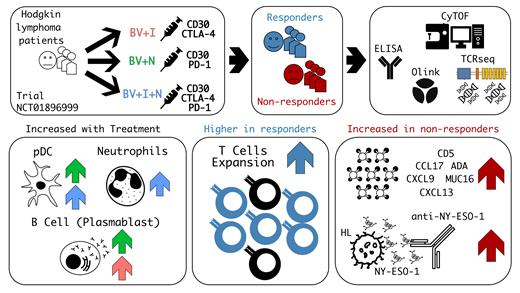Background: We previously reported that treatment with the anti-CD30 antibody-drug conjugate brentuximab vedotin (BV) in combination with the checkpoint inhibitors targeting CTLA-4 and/or PD-1 (ipilimumab (I) and nivolumab (N)) led to high overall response rates (ORR) and complete response (CR) rates in relapsed/refractory (R/R) Hodgkin's lymphoma patients in a Phase 1 ECOG-ACRIN sponsored clinical trial. As previously presented in the Phase 1 component of NCT01896999 (E4412), the ORR for the treatment arms were: BV+I 76%, BV+N 89%, and BV+I+N 82%, with CR rates of 57%, 61%, and 73% across the groups, respectively. This suggested that not all patients who responded derived equal benefit. Moreover, with a median follow-up of 2.24 years, the PFS of 1.1 year, NR, and 2.49 years across the groups suggest that even some patients who achieved CR progressed on or subsequent to treatment. Currently biomarkers have no ability to predict which patients will maximally benefit from these therapies. We investigated blood-based immune biomarkers mechanistically across all cohorts which may explain differential responses and guide future treatment decisions for R/R HL patients.
Methods: Peripheral blood plasma for 54 of 61 (89%) patients evaluable for response was collected at up to 4 time points and tested for 92 immuno-oncology soluble analytes with Olink proximity extension assay and for antibody titers to 20 known tumor antigens by ELISA. Matching peripheral blood mononuclear cells (PBMC) were analyzed by CyTOF mass cytometry for major immune cell subsets and marker surface expression, and for T cell receptor diversity by Immunoseq®. Mixed effect linear models were used to identify significantly associated changes (P<0.05) related to treatment longitudinally within groups and to ORR between groups.
Results: Analysis of plasma demonstrated durable increase in soluble plasma PD-1 and decreases in CCL17, ANGPT2, MMP12, IL13, and CXCL13 in N-containing regimens, and higher GZMA and CAIX in BV+I (P<0.05). Despite baseline heterogeneity in PBMC composition, we found durable increases in plasmacytoid dendritic cells (pDC) after N-containing treatments, and transient increases in plasmablasts and memory B cells, as well as early decreases in naïve CD4+ T cells and neutrophils across treatments. Treatment with BV+I+N demonstrated late increases in neutrophils, and changes in memory B cell markers. Clinical benefit analyses revealed that elevated soluble CD5, ADA, CXCL13, and CCL17 at baseline or after two treatment cycles were associated with worse ORR (P<0.05), and that a module of co-regulated soluble analytes at baseline, including MUC16, was associated with worse progression free survival (PFS) (P<0.05). NY-ESO-1 autoantibodies were more frequent in non-responders, and the top 10% of expanded TCR clonotypes were increased in responders after one treatment cycle (P<0.05).
Conclusion: This data reveals differential immune activation based on treatment modality for patients with R/R HL receiving checkpoint-based regimens in combination with an ADC. Our data highlights potential tumor- and immune-derived predictive and pharmacodynamic biomarker candidates of response and resistance. These novel findings have relevance for R/R HL patients receiving immunotherapy and other immunotherapy combinations such as immuno-chemotherapy platforms. Prospective evaluation of these biomarkers in the Phase II component of this study, a randomized comparison of BV+N vs. BV+N+I which has completed adult accrual, is planned.
Figure Legend
Clinical responders and non-responder patient samples were analyzed using ELISA (auto antibodies), CyTOF (Cell populations), TCRseq (T cell clonality) and Olink (proteomics). The results showed that pDCs, Neutrophils and B-Plasmablasts increased with specific drug combinations independently of clinical response. While T Cell expansion was associated with clinical response, the increase of auto antibodies against NY-ESO-1 and circulating proteins CD5, ADA, MUC16, CXCL13, CXCL9 and CCL17 were associated with worse prognosis
Disclosures
Diefenbach:Abbvie: Consultancy, Research Funding; Astra Zeneca: Consultancy, Research Funding; Beigene: Consultancy, Research Funding; Genmab: Consultancy, Research Funding; Merck: Consultancy, Research Funding; Regeneron: Consultancy, Research Funding; Roche/Genentech: Consultancy, Research Funding; Seattle Genetics: Consultancy, Research Funding. Ansell:ADC Therapeutics, Affimed, Bristol-Myers Squibb Company, Pfizer Inc, Regeneron Pharmaceuticals Inc, Seagen Inc, Takeda Pharmaceuticals USA Inc.: Other: Contracted Research. Gnjatic:Genentech,: Research Funding; Takeda.: Research Funding; Regeneron: Research Funding; Celgene: Research Funding; Bristol-Myers Squibb: Research Funding; Boehringer-Ingelheim: Research Funding.


This feature is available to Subscribers Only
Sign In or Create an Account Close Modal